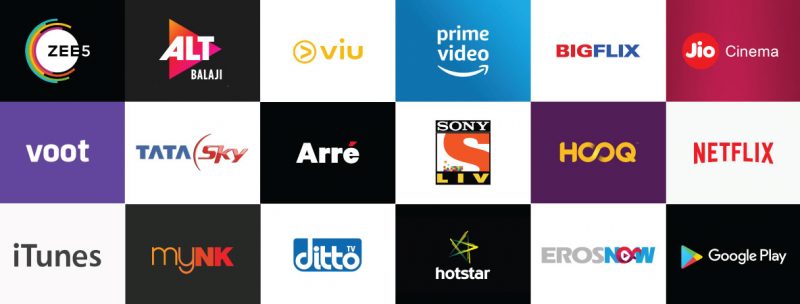We’re in the middle of a pandemic and it has changed our lifestyle, especially how we watch movies. All the cinephiles out there are looking for a new source of entertainment but when all the theatres are non-functional, what could the production houses and cinephiles do apart from waiting for this pandemic to end? That’s where OTT platforms establish a new trend; releasing the movie on OTT platforms instead of a theatrical release. Now, this trend has sparked a debate that how OTT platforms are changing the cinema industry and is this change good for the viewers and producers? Let’s jump straight to that.
What is an OTT platform?
OTT or “Over The Top” means going “over” a cable box to provide access content via the internet. OTT is a channel where entertainment services are delivered directly to the end-user. These platforms run on a subscription model, where the user pays a fixed amount of money in return for their services. The user can have access to these platforms on an internet-enabled device.
Popular OTT platforms in India
The major OTT platforms in India are Netflix, Disney+Hotstar, Amazon Prime. The success of these platforms has encouraged many others to enter this arena and small platforms are on a rise along with their original content. Sony Liv, Voot, Zee5, Alt Balaji, MX Player, Mubi, Eros Now, etc are the few examples of surging demand for OTT platforms in India.
Now that you can comprehend OTT platforms, let us help you understand its impact on the cinema industry.
Overseas Release
We’re living in a time when the conventional methods are shattering whether it is a job, meeting, or releasing a movie. Before Covid-19, OTT platforms were best known for their catalogues and producing new series, movies. But, Gulabo Sitabo changed everything as the movie went straight for an OTT release on Amazon Prime.
The movie was released worldwide (with subtitles) on a single day expanding its reach to audiences across the globe. In the traditional method, it was not possible to release a small budget movie to release worldwide because of financial constraints and risks involved with it. But, with the new methods, a production house can release the movie worldwide with zero risks because they don’t have to care about the rate of return as they’re being paid a fixed amount, irrespective of the movie’s performance.
The risk is low
There’s no denying the fact that box office collections contribute to the entire revenue of a movie which is about 60-70℅, the rest of the revenue is collected by satellite and music rights. Star-studded movies produced by big banners have the potential to earn a significant amount of money from theatres but small budget movies don’t have that privilege. They work on a high-risk model, can’ even speculate the box office collections; it’s a hit or miss kind of situation.

We continuously read about movies entering the 100 crore club, but we don’t hear about the great movies because they can’t earn from the box office. A low budget movie will always be a high-risk situation in theatres whereas, on the OTT platforms, the situation is contrary. OTT is changing the cinema industry, promoting small budget movies and eliminating the risk involved by paying them a fixed amount of money, which would cover their expenses. The money paid by these platforms doesn’t have anything to do with the movie’s performance on the platform. It might do well or bad, so now the risk of the production houses has been transferred to the OTT platforms. But, we must consider the fact that OTT is a niche, and subscribers do prefer a content-oriented product rather than gibberish and cacophony of mainstream cinema.
Uncertainty for Big Budget Movies
OTT platforms are a boon to low budget movies with no risk, but with big-budget movies, it’s not that simple. The production house will push a big-budget movie for a theatrical release as they are doing with Sooryavasnhi, 83, Tenet, Wonder Woman, and many more. This is the case as they can’t recover their cost via OTT. Big budget movies with a good cast, fanbase, and a rewarding story do have the ability to earn more from the box office as it’d earn from the OTT platform.

Satellite rights contribute a fair amount of revenue to the production houses. Big budget movies receive a large sum of money for their satellite rights, and if the movie is successful the satellite and OTT rights will be sold accordingly. If they choose to release the movie on OTT platforms then there will also be a substantial drop in their satellite revenues.
We’re living in an exceptional phase, and we don’t know about the end of this, so the big-budget movies can sit on the releases of their movies, but not for too long. They might eventually agree to release the movie on OTT platforms as it’s always better to reach a break-even point than suffering huge losses.
Also See: Top 5 crime TV shows of all time: Look out for #3
Is OTT an alternative to theatre for the end-user?
No, it’s not. It is cheap, comfortable and in the middle of a pandemic, it’s totally safe, but the experience of a cinema hall can’t be compared with the experience of watching anything on your phone, laptop or TV.

As mentioned above, it provides a great platform for low budget movies to maximize their reach with no risk and cinephiles can access the kind of cinema according to their preference. OTT platforms have revolutionized the entertainment industry as we’re witnessing a paradigm shift in the business, but it can’t replace the theatre because going to a theatre is an experience which OTT platforms can’t imitate.




